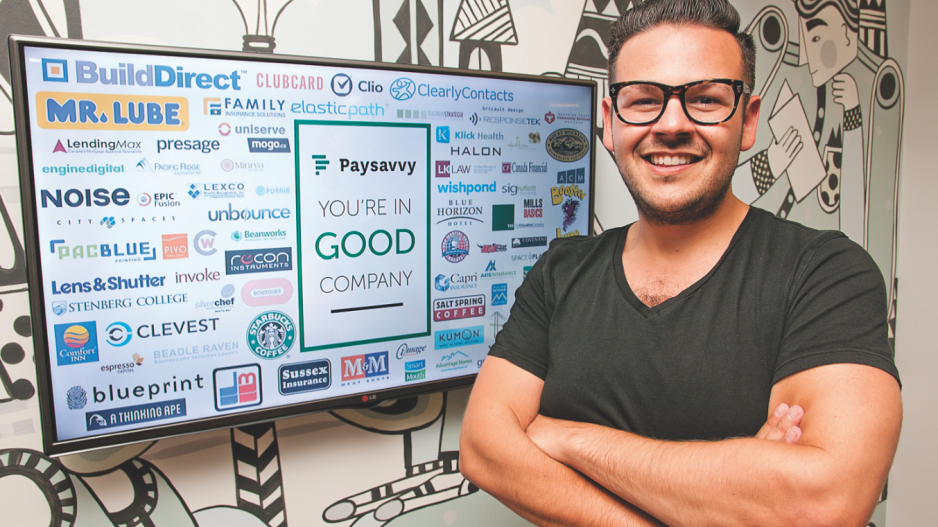After flying down to the Silicon Valley to visit Juniper Networks’ (NYSE: JNPR) sprawling headquarters in late June, Vancouver entrepreneur Wisam Abdulla was struck by the contrast between the tech firm’s mammoth size and its humble beginnings.
“This is a tech company that started with five people and now is at 9,000 [employees],” the chief operating officer and co-founder of tech startup Paysavvy told Business in Vancouver. And despite Juniper’s size, it was nearly impossible for Abdulla not to run into fellow Canadians dotting the landscape.
Paysavvy was one of 20 Canadian tech startups selected by the C100’s 48 Hours in the Valley program, which aims to accelerate growth at Canadian startups.
“Being down here and meeting those people and having those talks really gives you a sense of businesses down here, the different orientations they have,” Abdulla said.
Over the course of three days – a touch more than the 48 hours advertised – the non-profit tech advocacy group facilitated workshops, investor meetings and mentorship events, all of which were set up by Canadian expatriates living in the Silicon Valley.
“If there’s something we can do in the Bay Area, with all of our connections, and sacrifices we’ve made to come down here and work and build relationships here, I think it’s something that can be incredibly valuable for entrepreneurs in Canada,” said Toronto-born Dom Perri, Juniper’s director of strategy and corporate development.
Although he moved to the U.S. during the dot-com boom of the 1990s, Perri said it was still important to him to introduce Canadian entrepreneurs to Juniper executives and to mentor startups on best practices in corporate development. He visits Toronto a few times a year, and he said the way the tech ecosystem has matured since he left makes him somewhat jealous of the talent living in Canada.
“If I was in my early 20s right now, I’d be very excited about starting a company in Canada.”
When Glenda Dorchak moved to the U.S. in the 1990s, she said, there were just one or two places in North America a startup could be headquartered if it wanted access to qualified talent or capital.
“Now there are fantastic incubators and angel fund organizations across Canada who provide seed money to these businesses,” said the Business Development Bank of Canada board member, who tapped into her experience as a CEO at three tech companies when mentoring Canadians at C100 events.
“It’s an explosive time for Canadian entrepreneurism because not only is there a wonderful pool of talented individuals but [there is] great support with the financial community.”
Dorchak said one of the biggest surprises C100 selectees have when they arrive in the Silicon Valley is just how deep the Canadian talent pool is.
Industry estimates peg the Canadian population in the region at between 300,000 and 350,000. But Jamie Sutherland, general manager of U.S. products and solution at Xero, said it’s still difficult for Canadian entrepreneurs to understand what’s going on in the Silicon Valley if they don’t live there.
“Living in that environment and knowing what was going on in the other side is something I wish I had been introduced to,” said the Toronto native, who moved to the U.S. after working at Sage Software Canada’s Richmond office.
During the most recent C100 program, he spent his time catching up with Canadian financial tech startups on the major players in Silicon Valley, the local startup competition, which companies are getting funded and who to connect with.
“Talk to any startup. If they’re in that space, it’s pretty helpful to understand what’s going on in the U.S.,” Sutherland said, adding that he also emphasized to the startups how different fundraising is in a region where the level of investment is unlike anything seen north of the border.
BuildDirect – the so-called Amazon (Nasdaq:AMZN) of home-building products – has been one of the few Canadian tech startups to establish itself as an anchor in the Vancouver ecosystem, raising $110 million in financing to bring its valuation to $500 million.
CEO Jeff Booth began attending C100 events about three years ago, first to learn and now to educate Canadian entrepreneurs.
“A lot of the top Canadians left because there weren’t the same opportunities in Canada, and now that’s changing,” he said.
Booth said the local tech community is reversing the trend: Canadians are returning home.
He recently hired a Canadian from Amazon, and Dorchak said she just bought a home in Vancouver.
“You’re just starting to see the Canadian ecosystem, and specifically in Vancouver and pockets, really start to develop. And so the next 10 years is going to be a lot more exciting than the last 10 years,” Booth said.




